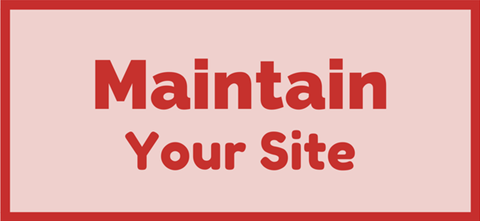 “Can you set up my website so we can be on the first page of Google?”
“Can you set up my website so we can be on the first page of Google?”
Unfortunately, the answer is ‘No.’
Fulfilling the first part of this request cannot generate the result requested. The result is not solely dependent on the having a website although having one would be necessary.
There isn’t a straightforward or direct correlation between the two.
Here’s another post for teachers, coaches and trainers who are getting their own websites. I have written about the essential things to consider when setting up a website here. In this post, I’d like to address the questions we often receive from clients who want website makeovers or a new websites.
Let’s take a look at the request again and sort out a few misconceptions before more people are deluded with the same confusion.
“Can you set up my website so we can be on the first page of Google?”
I: Setting up a website does not mean others will automatically know about it. Neither can you expect to have a ton of visitors coming to your blog or website if you have not done the work to promote it.
II: Having a website does not necessarily put it on first page of Google, Bing or Yahoo. Setting up a website is just putting up a structure on the internet. No matter how much effort has gone into the design and development of the site, this alone will not and cannot make your site show up on the first page of any search result.
There are many other factors involved in optimizing a site. Having a website with your own web address is only the first step.
As for being on the “first page of Google”, well, that has taken on a new meaning now.
III: There is no more “being on the first page of Google for a certain keyword” universally. Search results have gone dynamic, is contextual and their Google SERPs are personalized and you need to know this.
That means Google will return different search results to different people depending on the user who is doing the search. Factors that would affect searches include:
- who the searcher has in her network (search has gone social)
- where she is performing the search from (search is contextual and affected by location)
- the history of her searches and (search has gone personal)
- the context of who she is (Google keeps a history of what she writes or comment about or is likely to want information on).
- Here’s a post on the SEO and the personalized search
Google builds a profile of your search habits over time and serves up more relevant search results.
Showing up on “the first page of Google” now depends on who’s doing the search and it also means that you are more likely to show up for people who are looking for specific topics and messages that you are passionate about and engage in. Thus, you may be appearing to a more targeted audience looking for something you talk about or are offering.
This leads to my other important point.
IV: SEO efforts is not something to be done on or to a site. Rather it has to be done alongside the brand with its active involvement. David Amerland the expert in Semantic Search has this to say:
 This is an excerpt of a training on Semantic Search that is done by Martin Shervington and David Amerland, used with permission. To get access to the free training, you can click on this link here: http://www.plusyourbusiness.com/quickstarter-signup#semantic
This is an excerpt of a training on Semantic Search that is done by Martin Shervington and David Amerland, used with permission. To get access to the free training, you can click on this link here: http://www.plusyourbusiness.com/quickstarter-signup#semantic
While you may not need to know the nuts and bolts of SEO or search, having an appreciation of what SEO constitutes is vital so you can discern the myths from the facts and know which experts to follow and which vendors to hire.
 SEO is not about applying proprietary trade secrets or killer formula on your website.
SEO is not about applying proprietary trade secrets or killer formula on your website.
Today’s SEO effort needs to be tied in with your brand’s message and mission. These efforts need to align with your values, speak with your voice and address the concerns at the heart of your mission.
Showing up online and being visible depends on the credibility and authority (domain expertise) you or your brand have built up. And these cannot be done apart from having your active involvement, in partnership with you through the content and messages you deliver.
You should also always have visibility into what is being done to you site by your vendors. If SEO service providers are selling their services as “proprietary” and in a black box then I suggest you stay away from these vendors because you need to ensure that all SEO efforts for your brand are in compliance with Google’s (and other online platforms’) guidelines.
Things change so much so fast in the digital media world it is important for you to keep abreast with trends. If your SEO experts are not aware of changes in search algorithm or if less than noble and credible ways are used to boost search ranking then red flags are up.
Panda 4.0 (Google search algorithm’s recent change) has been rolled out and the onus is on the website owner to make sure the SEO efforts you allow your vendor to perform is in compliance to the rules of the game. This is not something you can just outsource and not want to know about. In fact, you’ll need to be at the center of all SEO strategy.

As the owner of the website, you are the person agreeing to Google’s terms although you may be hiring professionals to help you implement these plans. It only makes sense then for you to know what you are allowing your vendor to do.
My hope is to help you understand jargon in everyday language and to look out for things that you are not aware of so you do not fall prey to ignorance or manipulation.
For your site to show up on searches you must have a clear central message that’s aligned with your business vision and mission. Marketing of your site through articles, blog posts and videos (generally referred to as content) should reflect a consistent message based on your mission and solution.
No external freelancers or outsourced workers will be able to build your business for you without having your involvement, sharing your message and telling others about the solution and the answers you have.
Penquine and Panda algorithm updates make it harder for manipulation of the search engine. In any case, SEO is not just about attracting traffic to your site through some “scientific” formula. And if the formula works (which I doubt it will if you are not involved in the exercise) visitors will be disappointed with what they see when you land at your page if you are not providing valuable content at the site that speaks to their needs.
So stay away from any form of manipulation. Build your business on integrity and authenticity. SEO efforts that offer to buy you links, likes or fans are going to hurt your brand big time.
And lastly, this is one common misconception I’d like to highlight even though it is obvious.
V. “Unless my site goes down I don’t need a webmaster or any technical support.”
Wrong.
 You’ll need a webmaster to help optimize your website and do on-going work to keep it optimized for searches.
You’ll need a webmaster to help optimize your website and do on-going work to keep it optimized for searches.
Websites that have been created need to be maintained, applications need to be kept updated, data needs to be backed up regularly and security needs to be put in place.
Webmasters will help check your site for malware, alert you of errors you need to fix in order to appear on search queries and to help you understand your audience as well as what works for your site.
- Would you be hiring cleaners and security guards to make sure things are in place for your physical stores?
- Why would it be different for your online store?
- Won’t it be too late if you go looking for technical support when you site goes down?
So yes, you’ll need to have a webmaster and you’ll need technical support unless you are a technical person who is also a savvy marketing expert; one that keeps up with the changes and know how to market your services effectively. Otherwise you’ll need to look for a trustworthy and reputable vendor, discuss requirement with him and see if there is transparency and a fit before you hire him.
Having the essentials in place is not buying insurance. It is proactively keeping your site safe and clean on an ongoing basis – so you can grow your online authority and presence.
If you need to maintain lock your physical store why wouldn’t you need the same for your online business?
In summary:
- Building a website will not get you to the top of Google’s page 1.
- While most people can build a simple static site, it will take the combined skills and knowledge of a technical person, as well as a web marketer to build an effective website.
- You’ll need a webmaster to keep checks on your website
- There is no more page 1 of Google as we know it and you, the brand will need to be in the center of any SEO effect for your online business.
Feel free to leave me your thoughts, questions and comments below. And if you need more information about any services discussed above, just get in touch!

Leave a Reply